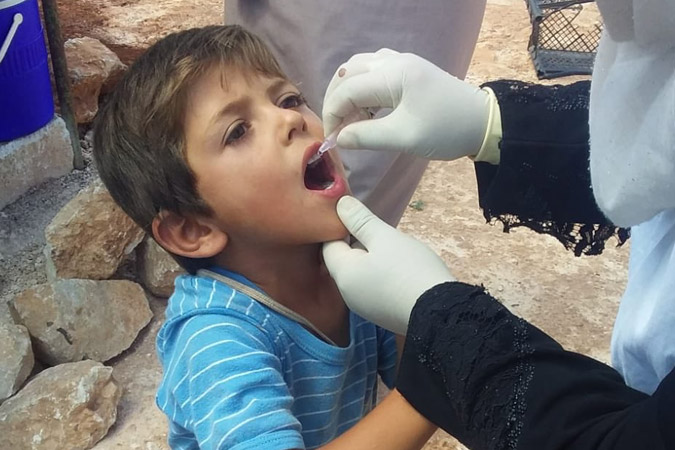Syria has a robust surveillance system for acute flaccid paralysis (AFP). Stool specimens are collected and sent to the WHO-accredited National Polio Laboratory (NPL) in Damascus to determine whether poliovirus infection is the cause of paralysis. Surveillance indicators reached global targets for 2019 with a detection rate of >3/100 000 children under the age of 15. Sewer samples were collected from 16 sites in 13 governorates to exclude the possibility of poliovirus circulating unnoticed within the community. While the Syrian MoH is responsible for training, supervising and managing surveillance staff, WHO provides financial support for transport, incentives for timely collection and analysis, and capacity building.
Massive population displacements in northwest Syria served to emphasize the need to keep AFP surveillance indicators at the highest level. In 2019, 427 cases were detected with a high non-polio-AFP rate. No cases of Sabin type 2 or vaccine-derived wild polio virus were detected. However, the risk of polio remains. Despite limited access to some areas in the northwest, WHO and partners are continuing their monitoring efforts.

In 2019, WHO conducted two nationwide and two subnational polio immunization campaigns in all areas accessible from Damascus. Three polio immunization campaigns for children under the age of five were conducted in all accessible areas of northwest Syria.
National Polio Laboratory in Damascus
The NPL in Damascus carries out viral isolation and intra-typic differentiation of the poliovirus. Laboratory staff have been trained on genetic sequencing, which will enable the laboratory to perform this function once it receives the necessary equipment. In 2019, the NPL successfully passed the annual accreditation exercise carried out by WHO. Accreditation provides formal confirmation that the laboratory has the capability and the capacity to detect, identify and promptly report wild and vaccine-derived polioviruses that may be present in clinical and environmental specimens. WHO funded all supplies and equipment required by the NPL and supported capacity-building for senior NPL staff through internal and external workshops, in coordination with the WHO Regional Office in Cairo.




